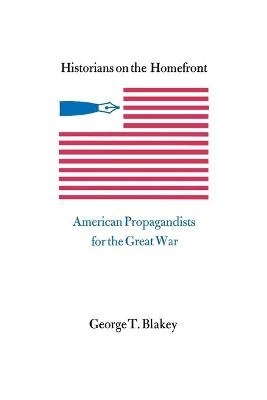
Historians on the Homefront
American Propagandists for the Great War
Seiten
2014
The University Press of Kentucky (Verlag)
978-0-8131-5129-8 (ISBN)
The University Press of Kentucky (Verlag)
978-0-8131-5129-8 (ISBN)
When Woodrow Wilson called on the American people to mobilize for war in April 1917, it was hardly surprising that historians should respond to their one-time colleague. Mobilization produced three organizations staffed by many of America's leading historians. All three organizations, the author shows, viewed as their task the mobilizing of America's intellectual resources in support of Wilson's war policies.
The postwar decade saw an inevitable cooling of wartime passions and a reevaluation of the causes of the war. George T. Blakey examines the postwar reaction to the activities of the CPI, NBHS, and NSL, which included congressional investigations and acerbic attacks in popular and scholarly periodicals. A number of the historians came to regret their wartime propaganda work; a few of these joined the ranks of the revisionists and turned on their colleagues. Others merely strengthened their Germanophobia. The majority, Mr. Blakely finds, resumed their academic careers, apparently untouched by the part they had played in mobilizing the American war effort. The question of scholarly integrity versus propaganda has never been fully resolved, the author concludes, but later generations of historians can still learn much from the example of America's World War I historians-turned-propagandists.
The postwar decade saw an inevitable cooling of wartime passions and a reevaluation of the causes of the war. George T. Blakey examines the postwar reaction to the activities of the CPI, NBHS, and NSL, which included congressional investigations and acerbic attacks in popular and scholarly periodicals. A number of the historians came to regret their wartime propaganda work; a few of these joined the ranks of the revisionists and turned on their colleagues. Others merely strengthened their Germanophobia. The majority, Mr. Blakely finds, resumed their academic careers, apparently untouched by the part they had played in mobilizing the American war effort. The question of scholarly integrity versus propaganda has never been fully resolved, the author concludes, but later generations of historians can still learn much from the example of America's World War I historians-turned-propagandists.
George T. Blakey is professor emeritus of history at Indiana University East.
| Erscheint lt. Verlag | 15.7.2014 |
|---|---|
| Verlagsort | Lexington |
| Sprache | englisch |
| Maße | 152 x 229 mm |
| Themenwelt | Geschichte ► Allgemeine Geschichte ► 1918 bis 1945 |
| Geisteswissenschaften ► Geschichte ► Regional- / Ländergeschichte | |
| Sozialwissenschaften ► Politik / Verwaltung | |
| ISBN-10 | 0-8131-5129-5 / 0813151295 |
| ISBN-13 | 978-0-8131-5129-8 / 9780813151298 |
| Zustand | Neuware |
| Informationen gemäß Produktsicherheitsverordnung (GPSR) | |
| Haben Sie eine Frage zum Produkt? |
Mehr entdecken
aus dem Bereich
aus dem Bereich
ein Psychologe erlebt das Konzentrationslager
Buch | Hardcover (2024)
Kösel (Verlag)
CHF 30,80
Mythos „Stauffenberg-Attentat“ – wie der 20. Juli 1944 verklärt und …
Buch | Hardcover (2024)
Goldmann (Verlag)
CHF 33,55


